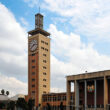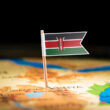NAIROBI,Kenya – Climate change isn’t a distant problem waiting to happen. It’s a crisis unfolding right now. However, in most countries, it still hasn’t found its way to the centre of political discussions. Instead, it lingers on the sidelines of debate, even though it’s the looming threat that affects every policy decision we make today. We need to start treating climate change as the political issue that it truly is.
At its core, climate change is about power, privilege, and how they are distributed across countries and generations. It determines who gets to flourish and who suffers the consequences. Wealthier nations have spent centuries burning fossil fuels, growing their economies at the expense of poorer and more vulnerable countries that are left to deal with the consequences of global warming such as floods, famines, and wildfires that they contributed the least to causing.
Climate change has become a battleground where the interests of different nations, corporations, and civil society organisations (CSOs) collide. Political leaders tend to prioritise policies that make “economic sense,” even if those policies come at a heavy cost to the environment.
They promise GDP growth, job creation, and development, but these gains often come with environmental degradation. Businesses also join the game, putting up greenwashing campaigns to appear eco-friendly while continuing to pump out harmful emissions. The result? A dangerous charade where everyone pretends to care about the planet, but nothing really changes as long as profits keep flowing.
The struggle over climate change reflects a broader power dynamic, one that pits States against Non-State actors. Environmental CSOs, driven by the need for climate justice, often find themselves facing off against political and corporate interests that prioritise profits over the planet.
For many governments, climate change is seen as a threat to national security. It destabilises agriculture, forces migration, and fuels conflict over dwindling resources. Yet, the political and economic elites who have the power to make real changes often resist the very reforms that could help curb the crisis.
Moreover, political leaders frequently play a double game. On the one hand, they speak publicly about the need for climate action. On the other hand, they undermine global climate agreements behind closed doors in favour of protecting their national economic interests.
A clear example of this is when Trump pulled the U.S. out of the Paris Agreement. Climate diplomacy took a backseat in the name of so-called “economic progression.”
Take a look at the manifestos of political parties in major democracies, and you’ll notice an unsettling pattern. Climate change is rarely given the attention it deserves. When it does appear, it’s often diluted by vague commitments.
Politicians might mention it here and there, but rarely does it feature as a core issue in their campaigns. Voters are promised jobs, economic growth, and lower taxes, but they rarely hear any firm commitments to reduce carbon emissions or pursue ambitious climate policies.
This absence of climate action from political manifestos is especially dangerous in years like this one, a super-year of elections. With major greenhouse gas emitters like the U.S. gearing up for another presidential election, the stakes couldn’t be higher.
The next U.S. president will have immense influence over global climate policy and funding. For example, Trump’s climate denialism undermined international efforts when he withdrew from the Paris Agreement. His decision wasn’t just a domestic issue, it sent shockwaves around the world. And while the U.S. economy may have seen short-term benefits, the most vulnerable nations paid the price.
This issue isn’t confined to wealthier countries. Kenya, like many nations in the Global South, is facing a climate crisis that intersects with poverty, governance, and economic insecurity.
Climate change is putting a strain on Kenya’s agricultural systems, disrupting rural economies that millions depend on. As temperatures rise and rainfall patterns become unpredictable, food security becomes more and more threatened. This creates the perfect conditions for conflict and displacement.
Despite these challenges, Kenya’s political landscape (much like that of other countries) tends to put short-term economic growth ahead of long-term sustainability. Election cycles come and go, often missing the opportunity to bring climate change to the forefront of political conversation.
This needs to change. We can’t afford to treat climate change as a side issue any longer, whether in Kenya or anywhere else. It is an existential crisis that demands a shift in political priorities worldwide.
The climate crisis is deeply political. It’s not something that science alone can solve, nor will technology and innovation be enough to turn the tide. The systems that drive our economies; capitalism, political power, and corporate influence are what led us into this crisis, and those same systems now stand in the way of the solutions.
To truly address climate change, we need to confront these systems head-on, challenge the political elites who benefit from them, and demand a transformation that puts justice, equity, and sustainability at the centre.
As voters, citizens, and activists, we must expect more from our leaders. Climate action can no longer be an afterthought or a “nice-to-have” in political manifestos. It must be a core focus of every political platform. This is about more than just saving the environment. It’s about securing the future for humanity as a whole. If we fail to act now, we are essentially choosing to let the environmental catastrophe unfold.
The time has come to make climate change a central issue in politics. We need to hold our leaders accountable, challenge the greenwashing tactics of corporations, and push for an overhaul of the systems that brought us to the brink of disaster. The window to prevent catastrophic climate collapse is closing fast, and the time to act is now. We owe it to ourselves, to future generations, and to the planet we all share. Let’s fight for a world where people and the environment can thrive together.
The writer, Christine Wainaina is a climate action champion and Programme Consultant at the Kenyan Section of the International Commission of Jurists (ICJ Kenya). This article was first published on the Daily Nation.







